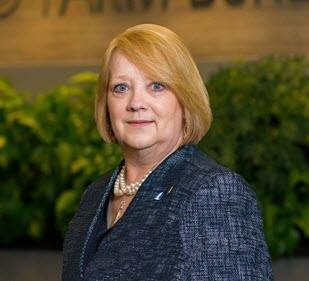Karin Bright battled breast cancer in 1999 and 2005
By Diego Flammini
Staff Writer
Farms.com
Karin Bright felt something come over her when she received her first breast cancer diagnosis in 1999.
“It was a very personal, faith-based thing,” she told Farms.com. “When the doctor gave me my biopsy results, I felt this warm rushing feeling come over my body and heard a voice tell me I don’t need to worry and everything is going to be okay. In that moment I knew it was the voice of God.”
The farmer from Athens, Ohio grows corn, soybeans and wheat with her husband, David.
Bright found a lump during a self-exam.
About one in eight U.S. women will develop breast cancer in her life and it’s the most common cancer diagnosed in women, breastcancer.org says. And fewer than 15 percent of women who get breast cancer have a family member diagnosed with it.
Bright’s grandmother, cousin and aunt all experienced breast cancer.
Channeling her experience in agriculture as a farmer and member of the Ohio Farm Bureau’s board of directors, Bright did what many farmers are accustomed to doing.
She took the news in stride and pushed forward.
Bright endured nine months of chemotherapy, continued to work at her retail job and had a lumpectomy to remove the cancerous breast tissue.
Feeling sorry for herself was never an option for Bright.
“You just have to keep going,” she said. “If you need to have a cry or pound the walls, that’s okay. But when you’re dealt a hand, you have to play that hand. If I’m going to curl up in a corner and not life my life, I may as well die anyway.”
And life did go on for Bright.
 She continued in her role as president of the Athens County Food Pantry, working with the Girl Scouts of Black Diamond Council, the Alexander FFA Alumni, as an active member in her church community and supporting Ohio University, where she graduated with a bachelor’s degree in business administration.
She continued in her role as president of the Athens County Food Pantry, working with the Girl Scouts of Black Diamond Council, the Alexander FFA Alumni, as an active member in her church community and supporting Ohio University, where she graduated with a bachelor’s degree in business administration.
But then in 2005, history repeated itself.
She received a second breast cancer diagnosis.
Her doctors revealed that her breast cancers weren’t hereditary but were skin cancers that formed on that part of her body.
This time, she needed different treatments and had a mastectomy.
“It was much worse, and I did almost die from hemorrhaging,” she said. “But I’m a fighter and I have lots to live for. I wasn’t going to let the cancer take any of that away from me.”
Though many years have passed since her last treatment, Bright’s body is a reminder of the journey she’s been on.
“I see a survivor and I see someone who’s going to keep living their life,” she said.
There is one hurdle Bright has yet to overcome, though.
During Relay For Life fundraisers to help raise awareness and money for breast cancer research, the first lap of each relay is the Survivor Lap for women who have experienced breast cancer.
Bright helps with local Relay For Life events but hasn’t been able to bring herself to participate in the Survivor Lap despite beating cancer twice.
“I think I have a little bit of survivor’s guilt that I’m here, but I know some people who aren’t,” she said. “I don’t know if I’ll ever be able to.”
Though breast cancer mostly affects women, men can get it too.
A man’s lifetime risk of breast cancer is about 1 in 833.